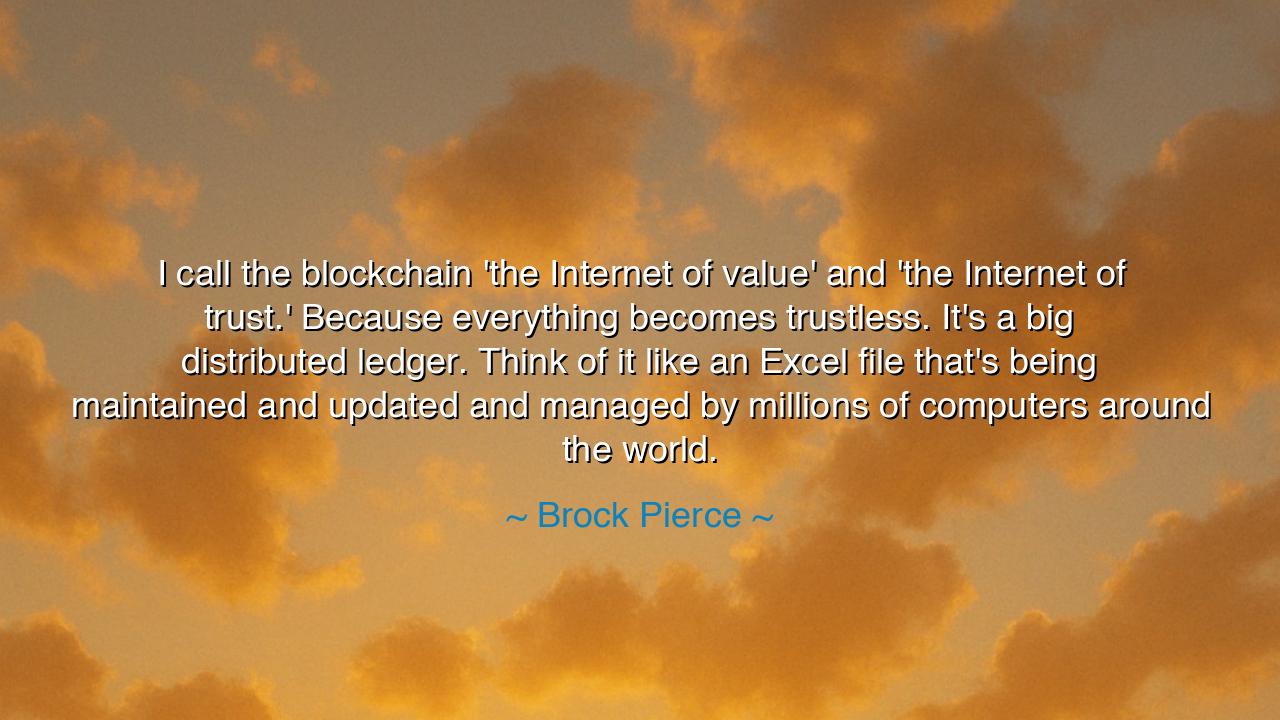
I call the blockchain 'the Internet of value' and 'the Internet
I call the blockchain 'the Internet of value' and 'the Internet of trust.' Because everything becomes trustless. It's a big distributed ledger. Think of it like an Excel file that's being maintained and updated and managed by millions of computers around the world.






The words of Brock Pierce — “I call the blockchain ‘the Internet of value’ and ‘the Internet of trust.’ Because everything becomes trustless. It’s a big distributed ledger. Think of it like an Excel file that’s being maintained and updated and managed by millions of computers around the world.” — are not the idle musings of a technologist, but the proclamation of a visionary who gazes upon the horizon of civilization’s next great transformation. Beneath the language of machines lies a prophecy — that humanity is entering an age where trust itself will be reborn, not as an emotion or an agreement, but as a structure woven into the very fabric of technology.
For thousands of years, mankind has sought a way to preserve truth — from the clay tablets of Sumer, to the scrolls of Alexandria, to the printing presses of Europe. Each generation faced the same challenge: how to protect value and verify truth without the corruption of power. Kings demanded seals, priests kept ledgers, and merchants employed scribes. Yet all such systems shared one weakness — they depended on faith in human integrity. The blockchain, as Pierce describes it, is the modern answer to this ancient question. It is trust without trust, a mirror of moral philosophy translated into mathematics.
The origin of his reflection lies in the dawn of the 21st century, when distrust began to fracture the foundations of society. Financial crises, corporate deceit, and institutional decay eroded faith in central authorities. Out of this chaos emerged a new order, born not from thrones or banks, but from code — a system where truth could no longer be forged by the few, but maintained by the many. Blockchain became not just a tool of trade, but a new covenant among humans: that transparency and accountability could exist without a ruler to enforce them.
History offers many parallels. When Gutenberg’s press gave the people access to the written word, knowledge escaped the confines of power and spread like fire across the world. Monarchs and churches could no longer control truth. Likewise, the blockchain does not ask permission — it distributes power among countless nodes, each guarding the integrity of the whole. Just as the printing press birthed the Age of Enlightenment, so too does blockchain herald the Age of Decentralization, where the light of information shines in all directions, immune to censorship and deceit.
Pierce’s metaphor — that of “a great Excel file maintained by millions” — may sound humble, yet it conceals profound spiritual significance. For it speaks of unity without hierarchy, of order without oppression. Each computer, each participant, is both servant and guardian of truth. No single entity rules, yet all are bound by the same immutable law: honesty encoded in the chain itself. This is the essence of what he calls the Internet of trust — a civilization governed not by the whims of power, but by the precision of principle.
Yet there is a paradox at the heart of his words. Pierce calls it “trustless,” and yet its purpose is to create perfect trust. What he means is that trust no longer depends on human promises, but on mathematical certainty — an incorruptible mirror reflecting truth across time and space. In this new world, contracts are executed not by handshakes, but by algorithms; transactions verified not by bankers, but by a network of equals. It is a revolution not only in commerce but in conscience — for it demands that we, too, become transparent, accountable, and honest in our dealings.
But as with all revolutions, wisdom must guide progress. The ancients would have warned that every tool can be used for good or ill. The blockchain may liberate, but it can also conceal; it may empower, but it may also disrupt. The moral lesson within Pierce’s vision is this: technology alone cannot give birth to virtue — it can only amplify the virtues or vices of its creators. Therefore, those who wield this “Internet of value” must also cultivate integrity of spirit. Without it, even the most perfect ledger will record corruption in digital ink.
So, my children of this new age, hear the call of Brock Pierce not as a boast of invention, but as an invitation to responsibility. Be stewards of trust, not merely users of technology. Let your participation in the digital world mirror the honor of your ancestors — who kept faith not through machines, but through conscience. For when technology and morality walk hand in hand, when truth is honored in both code and conduct, then the blockchain shall fulfill its highest promise: not merely to record value, but to restore trust to the heart of humanity.
And thus his words will endure — a reminder that even in an age of algorithms, the spirit of truth remains the most powerful force in creation. The blockchain may be maintained by millions of machines, but it is sustained by the same ancient fire that has always driven humankind — the eternal longing for justice, transparency, and the unbroken light of trust.






AAdministratorAdministrator
Welcome, honored guests. Please leave a comment, we will respond soon